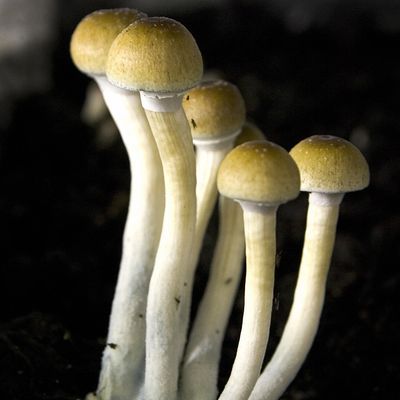
While the American smoking rate has more than halved since the 1960s, smoking is only increasing as a worldwide health issue. The WHO estimates that every year, six million people are killed by tobacco use, quadruple that of HIV and AIDS. It’s slated to be 8 million by 2030. Smoking is also notoriously difficult to quit: Only about 30 percent of people will stay smoke-free 12 months into the best medical treatments. Thus the need for fresh approaches to helping people quit. And it looks like psilocybin — the hallucinogen that puts the magic in magic mushrooms and can greatly help cancer patients with anxiety — might be a super-effective smoking intervention.
So says a new, small, and promising study by Johns Hopkins researchers in the The American Journal of Drug and Alcohol Abuse. The study’s 15 smokers, ten of whom were guys, had an average age of 51 and had been smoking 19 cigarettes per day for 31 years. In addition to the drug, the subjects took a 15-week training in cognitive behavioral therapy (where you learn to catch and reframe negative thinking, in addition to other meta-cognitive techniques). In week five they took a “moderate dose” of pure psilocybin via capsule, then a “high dose” two weeks later. They could then take an optional third high dose in week 13. In a follow-up 12 months later, ten of the participants had were confirmed via drug test as being smoke-free, and in longer-term follow-ups, on average of 30 months down the line, a full nine were still abstinent. That’s a 60 percent quitting rate.
While the researchers note in the paper that this wasn’t an “explicitly ‘spiritual’” intervention, the participants reported that psilocybin sessions had deep spiritual significance — at the one-year follow-up, 13 of the participants rated the trip as one of the five most spiritually significant and personally meaningful experiences they’d yet had in their lifetimes. “Our data does indicate that stronger mystical experiences are associated with success,” Matthew W. Johnson, a psychiatrist and the study’s lead author, wrote in an email to Science of Us. “Such experiences tend to reframe life priorities, with pure pleasure seeking dropping, and other aspects increasing (family, connection, higher principles). We are also exploring biological changes and are suspecting there may be long term changes in brain network dynamics, although we don’t have definitive evidence for that yet.”
There are limitations to this study: There was no control group, and the sample size was small. To that end, Johnson and his colleagues are currently running a clinical trial that randomizes use of psilocybin or a nicotine patch with the same cognitive-behavioral-therapy training. This time, they’re also using fMRI scans before and after people try to quit to track how brain images change. There’s reason to think it may work: A larger-scale study with booze found that a single dose of LSD can lower the chances of alcohol abuse. It looks like it’s not drug use itself that stops smoking or drinking, but that the transcendent experiences that hallucinogens offer can change the way people think about their lives.




